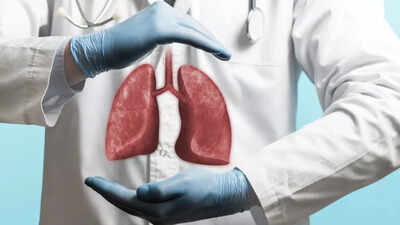
Quitting smoking is a vital step for improving overall health, but it does not immediately eliminate lung cancer risk. Harmful substances from years of tobacco use can continue affecting the lungs and other organs long after quitting. A study published in NIH found that while lung cancer risk gradually declines after cessation, it may take years for ex-smokers’ risk to reach that of never-smokers. This highlights the importance of adopting preventive measures, maintaining a healthy lifestyle with regular exercise, a nutrient-rich diet, and avoiding secondhand smoke can support lung repair and help further reduce long-term cancer risk.
How ex-smokers can reduce lung cancer risk
Commit to complete abstinence
One of the most important steps after quitting smoking is complete and sustained abstinence. Even occasional relapses, such as smoking “just one cigarette,” can reverse progress and reignite nicotine dependency, making it harder for the body to heal. Ex-smokers also need to avoid exposure to secondhand smoke, which can be equally harmful. Steering clear of environments where others are smoking is a crucial part of reducing ongoing risk. By maintaining total abstinence and protecting oneself from passive smoking, ex-smokers give their lungs the best chance to recover and lower future health risks. Additionally, adopting healthy lifestyle habits like regular exercise, a balanced diet, and stress management further supports long-term recovery and overall well-being.
Common symptoms of lung cancer
Adopt a healthy lifestyle
A balanced, active lifestyle plays a key role in supporting lung health after quitting smoking. Regular physical exercise, yoga, and breathing practices help strengthen lung capacity, improve oxygen flow, and enhance overall respiratory function. Exercise also boosts immunity, enabling the body to repair damage caused by years of smoking. Activities such as brisk walking, swimming, or cycling can improve cardiovascular fitness while supporting lung recovery. Integrating stress management techniques like meditation or mindfulness further aids in maintaining overall well-being, creating a holistic approach to reducing lung cancer risk.
Focus on an antioxidant-rich diet
Diet is another critical factor in recovery from tobacco-related harm. Ex-smokers benefit from consuming foods rich in antioxidants, which help neutralize free radicals and reduce inflammation in lung tissues. Green leafy vegetables, seasonal fruits, nuts, and whole grains supply essential nutrients that support cellular repair and detoxification. Antioxidants like vitamins C and E, carotenoids, and polyphenols may partially reverse oxidative damage caused by smoking, improving long-term lung health. By prioritizing nutrient-dense, minimally processed foods, ex-smokers can strengthen their body’s natural defense mechanisms and complement other preventive measures.
Go for regular health check-ups
Early detection is critical in reducing the impact of lung cancer. Ex-smokers should schedule annual health check-ups that monitor lung function and overall health. Depending on individual risk factors, imaging tests such as chest X-rays or CT scans may be recommended. Low-dose CT scans have shown potential for detecting early-stage lung cancer, though they are not yet widely used for mass screening. In addition, maintaining a healthy lifestyle, avoiding secondhand smoke, and discussing family history with a healthcare provider can further enhance early detection and prevention strategies. Personalized screening based on age, smoking history, and other health conditions remains the most effective strategy. Regular medical check-ups allow for timely intervention, improving the chances of successful treatment if abnormalities are detected.
Stay ahead with emerging screening methods
Medical science is continuously evolving, and new tools are emerging to help ex-smokers monitor their lung health. One promising development is liquid biopsy, a non-invasive test that can detect cancer-related genetic changes in the blood. This method may provide an early warning system for high-risk individuals, such as long-term smokers who have quit. By identifying potential issues at an early stage, liquid biopsies could offer a safer and more accessible approach to lung cancer screening in the future. Staying informed about emerging technologies and medical recommendations helps ex-smokers take proactive steps in safeguarding their health.Quitting smoking is a powerful and necessary step toward long-term health, but it is only part of the journey. Ex-smokers should commit to complete abstinence, maintain a healthy lifestyle, follow an antioxidant-rich diet, attend regular check-ups, and stay informed about emerging screening tools. Combining these strategies significantly reduces lung cancer risk and promotes overall well-being. By taking a proactive and holistic approach, ex-smokers can protect their lungs, enhance recovery, and enjoy a healthier life after tobacco.Disclaimer: This article is for general informational purposes only and is not a substitute for professional medical advice, diagnosis, or treatment. Always seek the guidance of a qualified healthcare provider regarding any medical condition or lifestyle change.Also Read: Why your eyes keep watering: Common causes, home remedies, and warning signs




